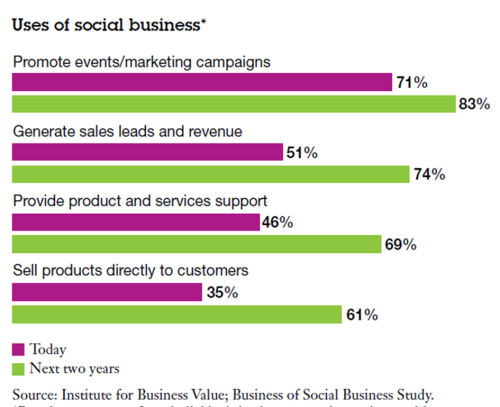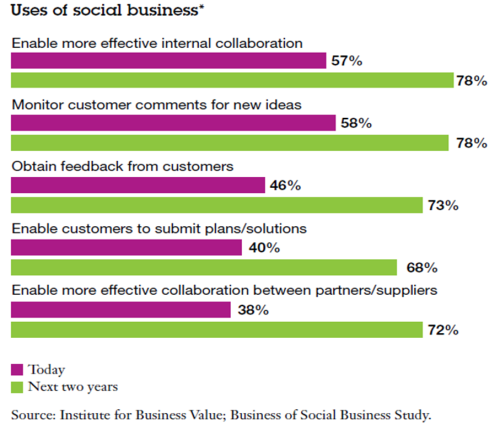Last week I discussed the difference between social media and social technology. There’s more.
The IBM Institute for Business Value’s report, The Business of Social Business, is full of research and survey data that can help in understanding how organizations are “seeing the value of applying social approaches, internally as well as externally. Social business can create valued customer experiences, increase workforce productivity and effectiveness and accelerate innovation.”
That’s a mouthful. But the point is that organizations are going beyond counting “Likes” on their Facebook pages and using LinkedIn to recruit new staff members who are optimistic about the value of embedding social technology into business processes that enable communication, collaboration and insight into customer, employee, supplier and business partner behavior. And they’re prepared to invest mightily in social tools that will help them achieve those outcomes.
Customer experiences and accelerating innovation
HR should be particularly aware of two areas that are seeing increased adoption of and investment in social technology – or social business, as IBM defines it: creating valued customer experiences and accelerating innovation.
Moving far beyond promoting brand awareness on Twitter, Facebook and LinkedIn, social business is becoming embedded in the end-to-end customer experience including lead generation, sales and post-sales service:
Social tools for competitive advantage
Look at the anticipated growth in the use of social technology to create stronger more persistent customer relationships. Organizations are are preparing to move far beyond marketing applications to sales and services applications.
In HR, we all talk a good game about the need for innovation and collaboration – whether or not we’re talking about social technology.
Many HR professionals are leading these charges within their organizations while the inhabitants of the C-suite are looking for every competitive advantage their employees, suppliers and customers can offer. The systemic use of social tools to enable communication and collaboration between and among these groups are powering some formidable product/service innovation and HR needs to understand them:
HR as a more relevant partner
Savvy organizations are using social technology to deepen the customer relationship by customizing the customer experience. This goes way beyond branding and messaging through social media.
As HR becomes a knowledgeable proponent of social technology and its tools – not just social media – it can become a more relevant partner in their organization’s transformation from a traditional 20th century venture to a 21st century social enterprise.
Clearly that’s where business is heading — social business, that is.
This originally appeared on China Gorman’s blog at ChinaGorman.com.
